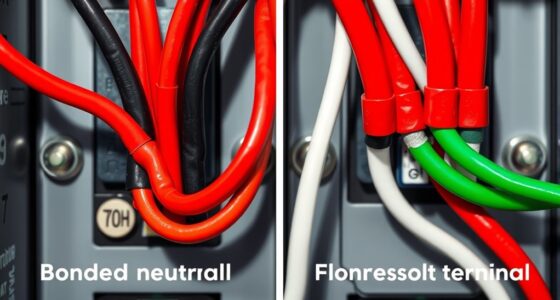Improper grounding of your portable generator can silently cause costly repairs, safety hazards, and legal issues. Using the wrong equipment or skipping regular checks can lead to electrical shocks, damage to sensitive devices, and potential fines for non-compliance. Overlooking proper grounding measures increases the risk of faults, faults, and insurance claim problems. By following correct grounding practices and maintenance routines, you can avoid these hidden expenses—continue further to learn practical ways to keep costs low and safety high.
Key Takeaways
- Improper grounding can cause electrical shocks, equipment damage, and fires, leading to costly repairs and safety liabilities.
- Using incompatible or low-quality grounding components increases future repair costs and risks safety violations.
- Non-compliance with grounding regulations may result in fines, legal issues, and insurance claim denials.
- Neglecting routine inspections of grounding systems can lead to undetected faults and expensive long-term damages.
- Overly complex or improper grounding setups can inflate costs without improving safety or performance.
The Hidden Expenses of Improper Grounding Techniques
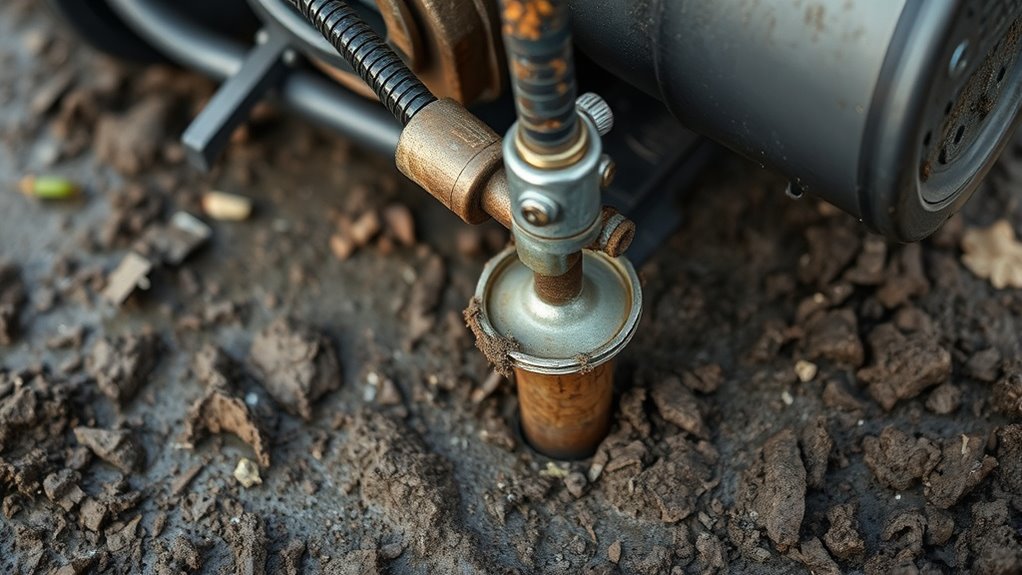
Improper grounding of portable generators can lead to unexpected and costly consequences. When grounding safety isn’t prioritized, you risk electrical shocks, equipment damage, or fires. These hazards can result in expensive repairs and even safety liabilities. Neglecting proper grounding techniques also complicates generator maintenance, making it harder to identify issues early and increasing repair costs over time. Using incorrect grounding methods might seem like a quick fix, but it can cause surges and unstable power delivery, damaging sensitive devices. Investing in correct grounding equipment and procedures helps prevent these hidden expenses. Regularly inspecting and maintaining your generator’s grounding system ensures safety and reduces long-term costs. Proper grounding is an essential part of responsible generator ownership that can save you money in the long run.
Costly Mistakes in Choosing Grounding Equipment
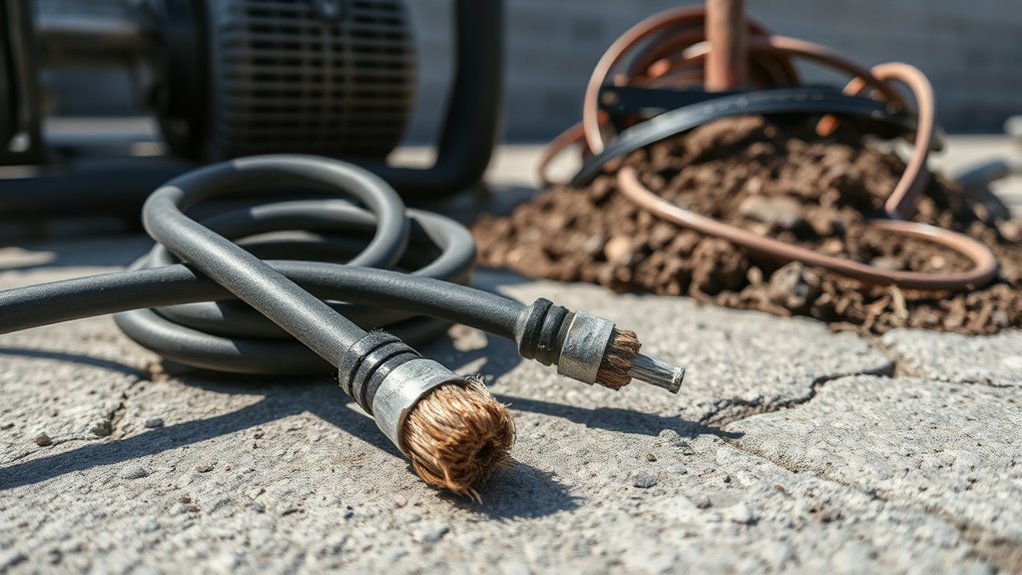
Choosing the wrong grounding equipment can lead to costly mistakes that compromise your generator’s safety and performance. Using inadequate or incompatible grounding equipment increases the risk of electrical faults, shocks, or equipment damage. A poor cost analysis might tempt you to buy cheaper grounding components, but this often results in higher repair or replacement costs later. Selecting the right grounding equipment requires understanding your generator’s power needs and the grounding system’s specifications. Failing to do so can lead to overspending on unnecessary features or, conversely, underfunding critical safety components. Making informed decisions upfront saves you money over time and ensures your generator operates safely and efficiently. Always evaluate the quality, compatibility, and long-term costs when choosing grounding equipment. Additionally, considering the preppy dog names can help you develop a memorable and meaningful name for your generator’s grounding setup, emphasizing its reliability and style.
Unexpected Repairs Caused by Grounding Errors
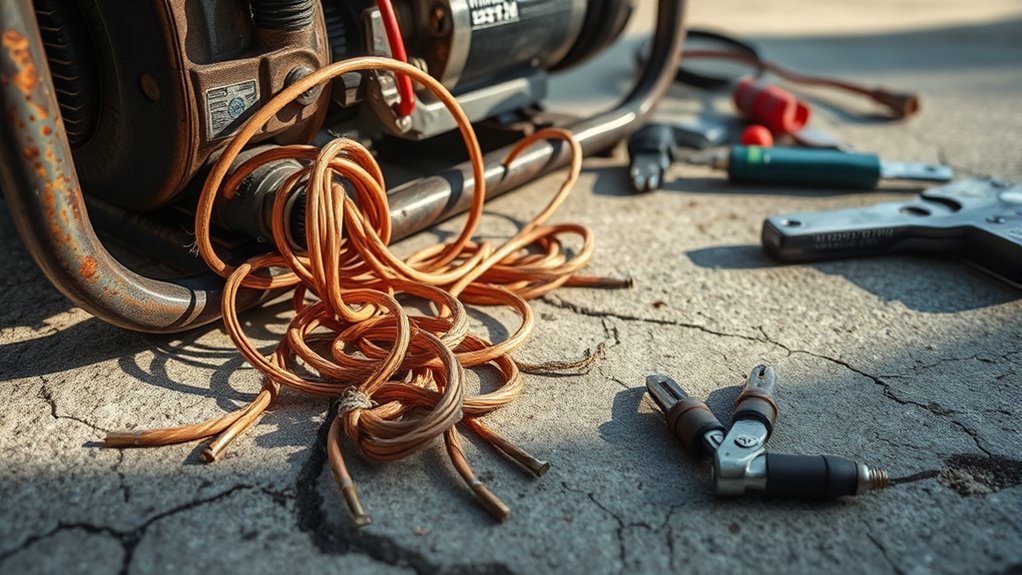
Incorrect grounding can cause serious damage to your generator’s components. These mistakes often lead to costly repairs that catch you off guard. Staying vigilant about proper grounding helps you avoid unnecessary expenses and downtime. Awareness of sound healing science can help you understand how vibrations and frequencies interact with electrical systems, potentially preventing issues caused by improper grounding.
Grounding Mistakes Damage
When grounding a portable generator incorrectly, you risk causing damage that can lead to costly repairs. Poor grounding safety can result in electrical faults that damage your generator’s components or connected devices. To avoid this, pay attention to common grounding mistakes:
- Connecting the grounding wire to an incorrect grounding point, leading to unstable grounding.
- Omitting the grounding conductor altogether, increasing the risk of electrical faults.
- Using damaged or improper grounding hardware, which compromises the safety and effectiveness of grounding.
- Neglecting to verify that the grounding system meets safety standards, which can compromise overall electrical safety.
These errors can cause unexpected electrical faults, damaging sensitive parts of your generator or appliances. Proper grounding ensures safety and prevents costly damage. Always follow manufacturer instructions and local electrical codes to avoid these damaging mistakes.
Repair Expenses Increase
Grounding errors can set the stage for unexpected and costly repairs down the line. When you neglect proper grounding, you risk damaging internal components or causing electrical faults that require expensive repairs. These issues often arise suddenly, increasing your overall maintenance considerations and repair expenses. To keep costs in check, focus on cost-effective strategies like regular inspections and ensuring grounding connections are correct. Proper grounding minimizes electrical stress, preventing damage that leads to costly replacements. Staying proactive with maintenance helps you avoid unexpected breakdowns and extend your generator’s lifespan. Remember, investing time in correct grounding practices now saves money on repairs later. Additionally, understanding security vulnerabilities associated with grounding errors can help you better protect your equipment from electrical faults and potential damage. By understanding how grounding errors impact your generator, you can better manage maintenance and reduce the risk of costly repairs.
Legal and Insurance Risks Linked to Incorrect Grounding
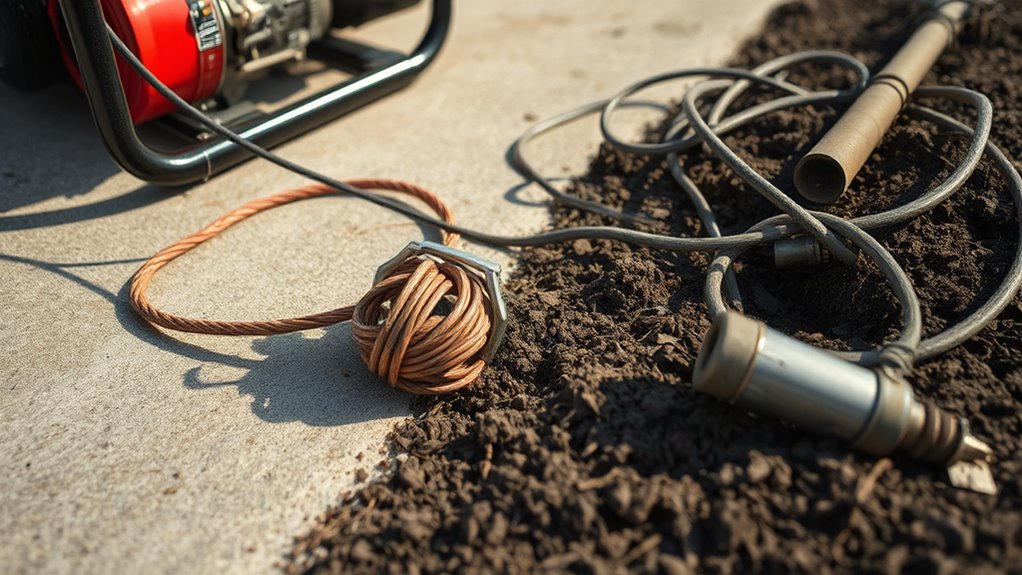
Incorrect grounding can expose you to legal liability if someone gets injured or if property is damaged. You might also face insurance claim denials if your grounding setup doesn’t meet regulations. Understanding these risks helps you stay compliant and protect yourself financially. Additionally, neglecting proper grounding practices can lead to recurring patterns of behavior that jeopardize your safety and legal standing.
Legal Liability Concerns
Have you considered the legal and insurance risks that come with improper grounding of your portable generator? If not, you could face serious consequences, including:
- Contractual liability: Your agreements may require proper grounding, and failure can breach contracts, risking lawsuits.
- Legal penalties: Authorities might impose fines or sanctions if your grounding setup violates safety codes.
- Insurance complications: Incorrect grounding can void coverage, leaving you responsible for damages or injuries.
Neglecting proper grounding can expose you to legal and financial risks that outweigh the initial cost savings. Ensuring your generator is correctly grounded reduces the chance of legal liability, helps you avoid penalties, and keeps your insurance coverage intact. Don’t overlook these critical legal concerns—your peace of mind depends on it.
Insurance Claim Denials
Neglecting proper grounding can jeopardize your insurance coverage when you need it most. Insurance pitfalls often arise from claim complications caused by incorrect grounding. If your generator isn’t properly grounded, your insurer might deny your claim, citing negligence or non-compliance with safety standards. This can leave you responsible for costly repairs or damages after an incident. Insurers expect homeowners to follow safety guidelines, and failure to do so can be seen as a breach of policy conditions. To avoid claim denials, ensure your generator’s grounding is compliant with local codes and manufacturer instructions. Proper grounding not only keeps you safe but also helps protect your coverage, giving you peace of mind during power outages. Don’t overlook grounding—it’s essential for both safety and insurance validity. Additionally, understanding fokos can help you stay informed about safety standards and best practices.
Compliance Violations
Are you aware that failing to follow proper grounding standards can lead to serious legal and insurance consequences? Non-compliance with grounding certification and adherence to compliance standards can result in fines, denied claims, and even legal liability. To avoid these risks, you should:
- Ensure your generator’s grounding certification meets all relevant compliance standards.
- Regularly verify that your grounding setup adheres to local codes and manufacturer instructions.
- Keep documentation of inspections and certifications to prove compliance if needed.
- Understanding the importance of ethical hacking principles can help identify potential vulnerabilities in your grounding and safety procedures before they lead to costly issues.
Ignoring proper grounding procedures not only jeopardizes safety but also puts you at risk of violating legal requirements. Proper grounding certification and strict adherence to compliance standards protect you from costly penalties and insurance claim denials, making it essential to stay informed and diligent.
The Price of Overlooking Grounding Regulations
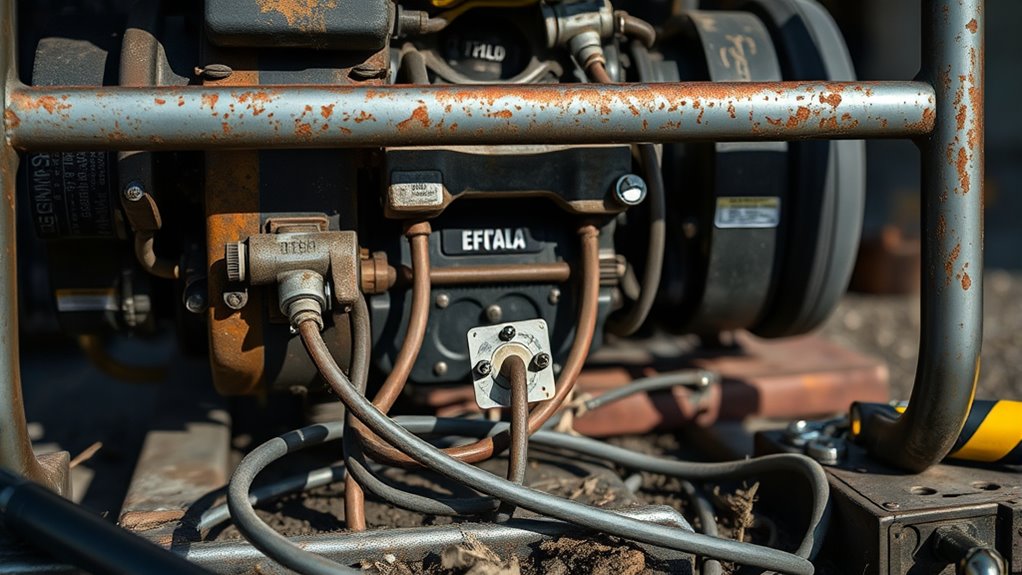
What happens when you ignore grounding regulations for your portable generator? You risk severe safety hazards, including electrical shocks and fire. Many believe grounding myths that lead to unsafe practices, disregarding grounding standards designed to protect you. Overlooking these rules can result in costly damages and legal consequences.
| Consequence | Explanation |
|---|---|
| Electrical Shock | Ungrounded systems increase shock risk. |
| Equipment Damage | Faults can cause costly repairs. |
| Legal Penalties | Non-compliance leads to fines or lawsuits. |
Ignoring grounding standards doesn’t just put you at risk—it can also invalidate your insurance. Stay aware of grounding myths and follow proper regulations to avoid these hidden costs and ensure safety.
How to Save Money by Properly Grounding Your Generator
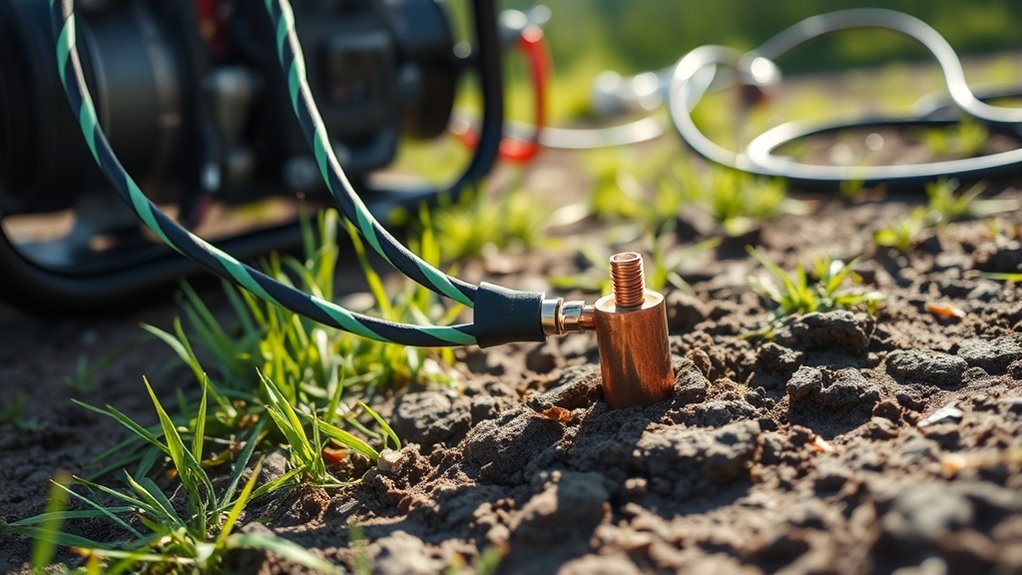
Properly grounding your portable generator can save you money by preventing damage and reducing repair costs. Good grounding safety minimizes the risk of electrical faults that could damage your equipment. To achieve this, focus on:
- Ensuring a solid connection to a grounding rod or grounding system to prevent stray voltage.
- Regularly inspecting grounding cables and connections as part of your generator maintenance routine.
- Following manufacturer guidelines to avoid improper grounding practices that could lead to costly repairs.
- Understanding the importance of grounding system effectiveness in maintaining overall electrical safety and performance.
Practical Tips to Minimize Grounding-Related Expenses
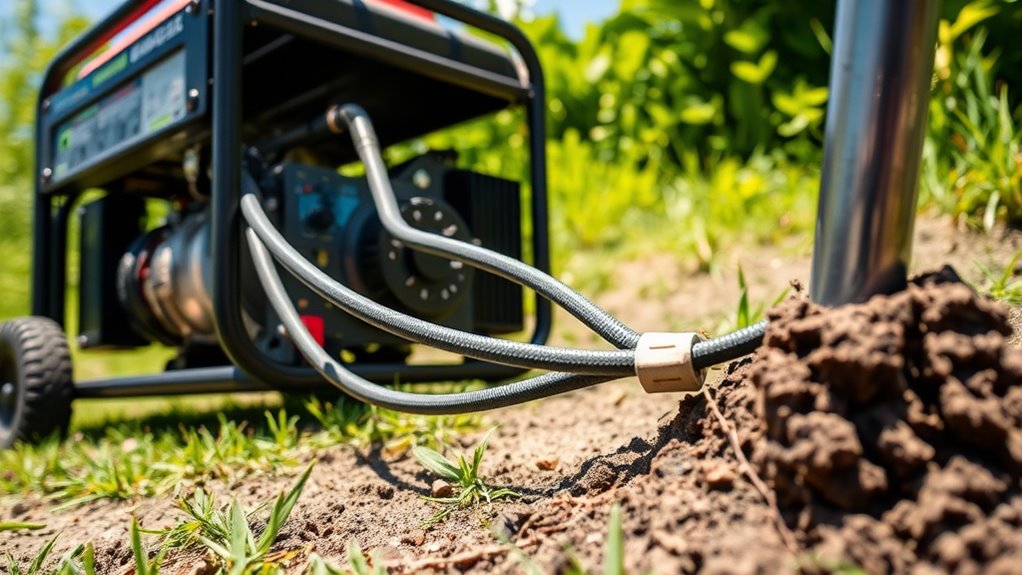
To minimize grounding-related expenses, you should prioritize regular inspection and maintenance of your grounding system. This helps catch issues early, preventing costly repairs down the line. Avoid falling for grounding myths, such as the belief that complex or expensive setups are always necessary; often, simple, proper grounding is sufficient. Implement cost-saving strategies like using standardized grounding components and performing routine checks yourself instead of hiring professionals for minor maintenance. Properly understanding your generator’s grounding requirements ensures you don’t over-invest or under-serve your system, which can lead to additional costs. Staying informed about grounding myths helps you make smarter decisions, ultimately reducing expenses while maintaining safety and compliance. Regular upkeep and accurate knowledge are your best tools for avoiding unnecessary grounding costs. Additionally, understanding grounding signs of spoilage can help prevent potential safety hazards related to improper grounding or damaged equipment.
Frequently Asked Questions
How Often Should Grounding Systems Be Inspected for Safety?
You should inspect your grounding system at least once a year to ensure safety. Regular inspection frequency is vital, especially if you use your portable generator often or in harsh conditions. Make sure to follow a maintenance checklist that includes checking for corrosion, loose connections, and proper grounding. Staying proactive helps prevent hidden costs and guarantees your generator remains safe and reliable during power outages.
What Are the Signs of Improper Grounding in Portable Generators?
You’ll notice grounding faults if you feel electrical shocks when touching your portable generator or connected devices, indicating improper grounding. Sparks, burning smells, or unusual noise can also signal grounding issues. These faults increase the risk of electrical shocks and damage. To avoid this, guarantee your generator’s grounding system is correctly installed and maintained regularly, and never ignore signs of improper grounding. Staying vigilant helps prevent costly repairs and safety hazards.
Can Grounding Mistakes Void My Generator’s Warranty?
Many believe grounding mistakes can void your generator’s warranty, and it’s true that improper grounding can lead to warranty issues. To protect your warranty, always follow grounding safety guidelines and manufacturer instructions. Failing to do so might be viewed as misuse or neglect, which can void coverage. So, guarantee proper grounding practices to maintain warranty protection and avoid costly repairs or replacements down the line.
Are There Specific Brands of Grounding Equipment Recommended?
Yes, there are specific brands of grounding equipment you should consider. Reputable brands like Bryant, Square D, and Eaton offer reliable grounding equipment that meets safety standards. When choosing grounding equipment, look for those with proper certifications and compatibility with your generator. Using trusted brand recommendations guarantees you get durable, effective grounding solutions, minimizing risks and avoiding costly mistakes that could impact your generator’s performance and warranty.
What Are the Long-Term Cost Benefits of Proper Grounding?
Proper grounding saves you money in the long run by reducing maintenance costs and preventing costly electrical damage. Regular grounding maintenance guarantees your portable generator stays safe and reliable, avoiding unexpected repairs. Investing in cost-effective grounding methods minimizes your overall expenses, keeping your setup efficient and secure. Over time, this proactive approach helps you save on repairs and replacements, making proper grounding a smart, economical choice for your generator needs.
Conclusion
Did you know that improper grounding can increase your risk of electrical shock by up to 80%? By understanding and avoiding hidden grounding costs, you can protect yourself from costly repairs, legal issues, and safety hazards. Taking the time to properly ground your portable generator isn’t just smart—it could save you hundreds or even thousands of dollars in the long run. Stay informed, follow regulations, and always prioritize proper grounding to keep your investments safe.



